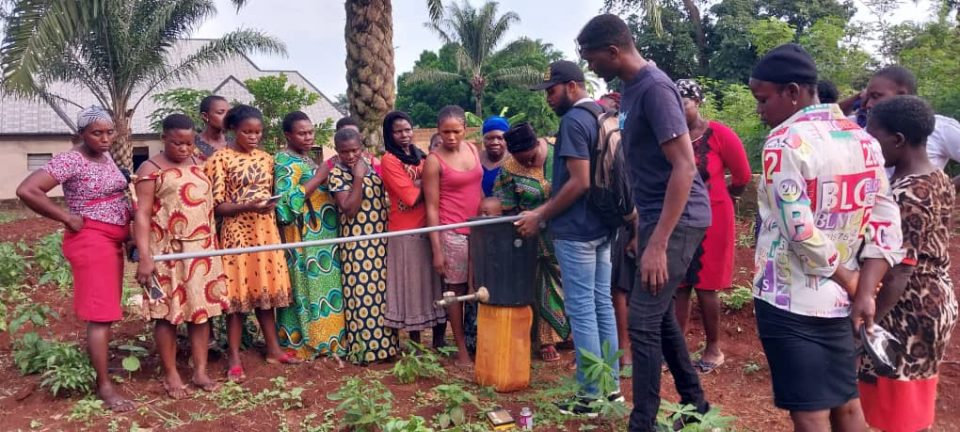Empowering Women and Marginalized Communities in Africa’s Agriculture through Artificial Intelligence

Figure 1: Women farmers in Nigeria receiving hands on training of APWENFarm app and Plantix app
The transformative potential of Artificial Intelligence (AI) in agriculture has garnered significant attention in recent years. In Africa, where agriculture remains a critical sector for livelihoods and economic growth, AI is seen as a promising tool to overcome various challenges. However, while AI offers substantial benefits, there is a risk that it could exacerbate existing inequalities, particularly for women and marginalized communities, if not implemented inclusively.
To address these concerns, the African Technology Policy Studies Network (ATPS), in collaboration with Kumasi Hive and the International Centre of Insect Physiology and Ecology (icipe), with generous support from Gender at Work, launched the Strengthening the Capacity of Women and Marginalized Communities in Africa’s Agriculture and Food Systems to Harness the Potentials of Artificial Intelligence Technology project. This initiative, part of the broader Artificial Intelligence for Agriculture and Food Systems (AI4AFS) innovation research network, was designed to promote gender equity and empower marginalized communities in the adoption and use of AI technologies in agriculture.
Project Overview
Launched in the year 2023, this project aimed to address the persistent productivity divide between men and women in African agriculture. Despite their dominance in the agricultural workforce, comprising 60% to 80% of all agricultural labour, women often face significant barriers, including limited access to technology, restricted land ownership, financial constraints, and lower levels of education. These challenges are further compounded for other marginalized farmers, making it difficult for them to benefit from AI advancements.

Figure 2 Women farmers in Nigeria during a hands on training session on setting up a Smart Drip irrigation system
The project was structured around two main objectives:
- Understanding Threats and Opportunities: The first objective was to assess the existing threats and opportunities related to AI adoption in agriculture for women and marginalized communities. This involved in-depth research and stakeholder engagement to identify the specific needs and barriers faced by these groups.
- Improving AI Adoption through Inclusive Design and Training: The second objective was to enhance the adoption and use of AI technologies by women and marginalized communities. This was achieved through a ‘design by inclusion’ approach, where AI tools were co-designed with input from the target groups, ensuring that the technologies were relevant and accessible. The project also included targeted training programs to build the capacity of women and marginalized farmers to effectively use AI in their agricultural practices.
Key Activities and Achievements
Throughout the project, several key activities were undertaken to achieve the set objectives:
- Inclusive Design Workshops: In-person workshops were held in Nigeria and Uganda, bringing together grantees, stakeholders, and representatives from women and marginalized communities. These workshops facilitated the co-design of AI tools tailored to the needs of these groups. By involving the end-users in the design process, the project ensured that the AI solutions developed were practical and user-friendly.
- Capacity Building Training: The project team, alongside technical experts, developed and delivered training modules focused on building the capacity of women and marginalized communities to adopt and use AI technologies. The training covered various aspects of AI, including digital literacy, technological competence, and practical application in agriculture. These training sessions were conducted virtually, allowing broader participation across different regions.
- Development of Best Practices: One of the key outputs of the project was the development of a comprehensive set of best practices and recommendations for gender-inclusive AI adoption in agriculture. These guidelines were co-developed with stakeholders and were designed to be applicable across different contexts in Africa. The best practices have since been published and are intended to serve as a resource for other AI4AFS subgrantees and organizations working on similar initiatives.
Impact and Outcomes
The Strengthening the Capacity of Women and Marginalized Communities in Africa’s Agriculture and Food Systems to Harness the Potentials of Artificial Intelligence Technology project has had a significant impact on the target groups and the broader agricultural sector in Africa:
- Enhanced Capacity: The project successfully built the capacity of women and marginalized communities in Nigeria and Uganda to harness AI in their agricultural practices. Participants reported increased confidence in using AI tools and a better understanding of how these technologies could improve productivity and efficiency in their farming activities.
- Increased Awareness and Adoption: The inclusive design approach and targeted training programs led to a higher adoption rate of AI technologies among the target groups. By ensuring that the AI tools were designed with the input of the end-users, the project made the technologies more accessible and relevant, thereby increasing their adoption.
- Promotion of Gender Equity: The project made significant strides in promoting gender equity in AI adoption within the agricultural sector. The best practices and recommendations developed through the project have the potential to influence policy and practice, ensuring that AI technologies are deployed in ways that are inclusive and equitable.
- Legacy and Future Directions: Although the project has concluded, its impact continues to resonate. The best practices and recommendations developed through the project are now available as a resource for other organizations and initiatives working to promote gender-inclusive AI adoption in agriculture. The project’s success also highlights the importance of inclusive approaches in technology adoption, serving as a model for future initiatives in Africa and beyond.
The project concluded with a dissemination webinar on August 12th, 2024, themed ” Insights and Best Practices from AI4D Artificial Intelligence for Agriculture and Food Systems Gender Innovation Project.” The webinar, provided an opportunity to share the project’s achievements and lessons learned with a wider audience. Watch the Webinar Here: https://www.youtube.com/watch?v=fNgw2jueg6I&t=21s

